Feeling like dipping your toes into learning the Tahitian language?
Well, you’re in the right place! No matter what your reason is – you’re heading to Tahiti, Bora Bora or you just love exotic languages… we’ve got you. ;)
In this post, we share everything from the Tahitian language background & origin, must-know phrases, to even a prompt guide to pronunciation. If you’d also like to always know your way around without Google, make sure to print out our cheatsheet with the 30 must-know phrases in Tahitian.
And, we warn you. As Tahitian isn’t an official language, Google translate doesn’t have it in its database! Guess, it’s time to go old-school.
So, firstly…
Where does the Tahitian language come from?
Tahitian belongs to the Eastern Polynesian language family. You’ll hear it mainly around the Society islands in French Polynesia – Tahiti, Moorea, Bora Bora, Raiatea, and others… Most commonly, the locals speak it in their homes but outside you’ll actually hear more French.
The official name of this indigenous language is Reo Tahiti and the number of native speakers left using it is currently unknown.
The siblings of Tahitian are Samoan language (with around 200,000 speakers), Maori from the New Zealands’ native population (around 100,000 speakers), and Hawaiian, with only a few native speakers still out there.
Here’s the breakdown:
Official name: Reo Tahiti
Language family: Austronesian Malayo-Polynesian Oceanic Polynesian Eastern Polynesian Tahitic Tahitian

Good to know
Tahitian had no written tradition until the arrival of western colonists. First, James Cook & his crew wrote down the Tahitian names of a few islands using English phonetics. Later, in the early 19th century, the English missionaries transcribed the language for the first time to introduce Bible to the islanders.
Is Tahitian similar to Hawaiian?
Yes, Tahitian and Hawaiian are quite similar. According to Langfocus, there’s 76% of lexical similarity between these two Polynesian languages.
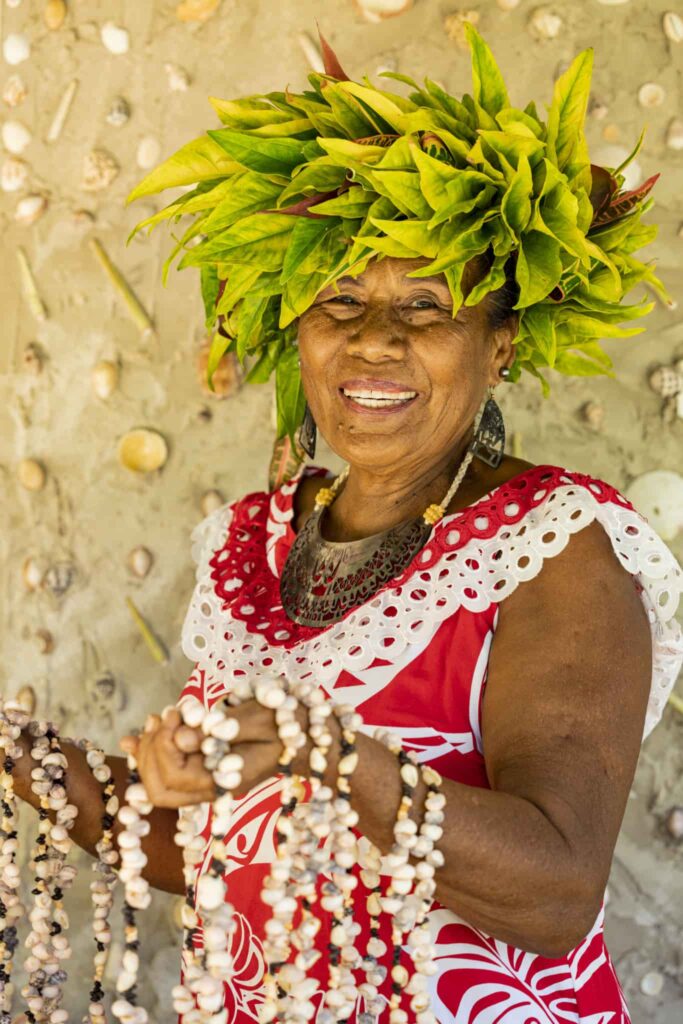
Your quick Tahitian language crash course
Ready to torture your brain a little? Let’s get to it!
The 20 must-know phrases in Tahitian
The basic Vocabulary
- Yes – E ( pronounced ay)
- No – Aita (pronounced eye-tah)
- Hello – Ia Orana (pronounced yo-rah-nah)
- Welcome – Maeva (pronounced mah-yeh-vah)
- Thank you – Maururu (pronounced mah-roo-roo)
- Man – Tane (pronounced tah-nay)
- Woman – Vahine (pronounced vah-he-nay)
- Child – Tamarii (pronounced tah-ma-ree-ee)
- Bye – Nana (pronounced nah-nah)
- How are you? – Maita’i oe? (pronounced may-tay oh-ay)
- I’m fine – Maita’i roa (pronounced may-tay ro-ah)
- Beer – Pia (pronounced pee-ah)
- No problem – Aita pe’a pe’a (pronounced eye-tah pay-ah pay-ah)
- Bread – Faraoa (pronounced fah-rah-o-ah)
- Water – Pape (pronounced pa-pay)
- Cheers – Manuia (pronounced mah-nwee-ah)
Some popular words you’ll see everywhere
And might be nice to know what they mean…
- Islet – Motu (pronounced moh-too)
- Ocean – Moana (pronounced mo-ah-nah)
- Flower – Tiare (pronounced tee-ah-ray) ..usually refers to the traditional Tahitian flower
- Black pearl – Poerava (pronounced po-ay ra-vah)
- Wrap-around beach skirt/dress – Pareu (pronounced pa-ray-oh)
For the compliment lovers
- Beautiful – nehenehe
- Well done – Pōpō
- Brilliant – Aita atu ai
- That’s very clever of you – Aita atu ai, tā ‘oe mea
A night out essential words
- Drums – Pahu
- Dance together – Tamure
- Have a good time – Fāna’o maita’i
- Song – Himene
- Food – Ma’a
How to read in Tahitian
When reading things in Tahitian there are two things you need to watch out for. The so-called ‘global stop’ represented with (‘), and the long vowels (ā, ē, ī, ō and ū).
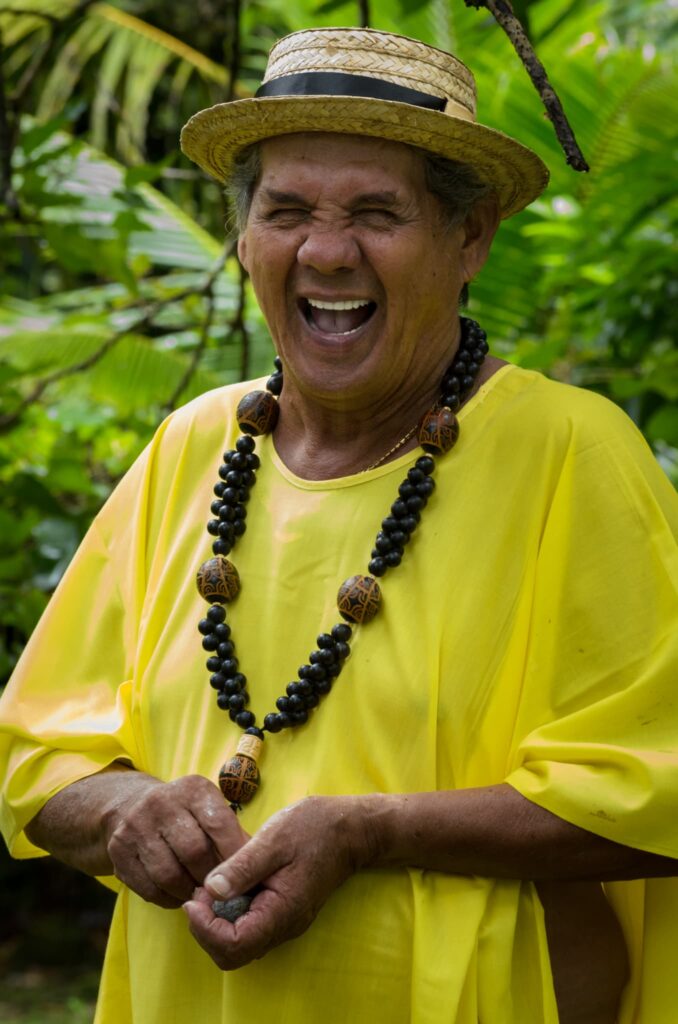
- The global stop
Although the global isn’t a letter but instead only an apostrophe (‘), we still treat it as a consonant. When reading, just emphasize the following syllable and do a short pause.
- The long vowels (ā, ē, ī, ō and ū)
When you see a strange letter like one of these above, just put an extra emphasis on it. As the name suggests, we pronounce them with a prolonged sound.

Good to know
The Tahitian language altogether has only 1000 words! (And you already know 30 of them 😉). This includes only 16 letters with five vowels (a, e, i, o, u), eleven consonants (b, f, g, h, k, m, n, p, r, t, v), and apostrophes. The intonation is very melodic making this language fun and pretty easy to learn.
Feeling lazy? You’ll get around Tahiti speaking these languages too
If tongues aren’t your thing, don’t worry. If you speak French you’ll be more than fine (hence you coming to French Polynesia) and English is broadly spoken too in most of the tourist sites and businesses.
Here’s a deeper look at the languages in Tahiti:
- Tahitian – Locals use it at home, and many Tahitian words made it into common use in French and English around the island. This means, that if you see people talking French, they’ll still use some Tahitian words – like Ia Orana, Tiare, etc.
- French – French is the only official language in Tahiti. If you speak French you’ll have no problem getting around these islands.
- English – Most businesses use English as their second language and the staff speaks it fluently. Since Tahiti and the bigger islands around are popular with tourists, you should have no trouble getting around with only English as well.

Good to know
While learning Tahitian isn’t necessary, I highly encourage to learn at least a few words like hello – Ia Orana, and thank you – Maururu. Locals love to see that effort from tourists, it makes their day, and they’ll treat you even nicer 🥰
FAQ:
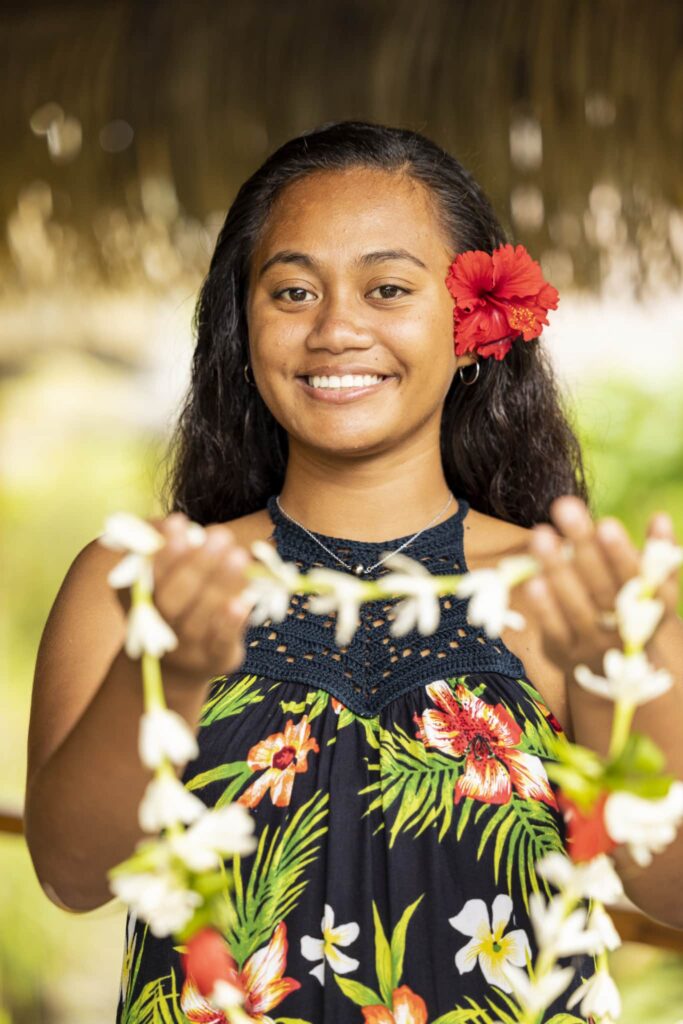
How do you say hello in Tahitian?
‘Hello’ in Tahitian is ‘Ia Ora na’. You’ll see this word written everywhere, and everyone using it, so you’ll get the gist of it very quickly. No worries.
How do you say goodbye in Tahitian?
The word ‘goodbye’ in Tahitian is ‘Nana’ pronounced nah-nah. For more Tahitian words check out the table above or download my full cheatsheet with the must-know words in Tahitian.
Is Tahitian similar to French?
No, Tahitian has nothing to do with French. Tahitian is a Polynesian language coming from the Kingdom of Tahiti since the early 1800s. It’s spoken by the indigenous population native to French Polynesia. French only became a new official language when France proclaimed Tahiti as a colony in 1880 and the inhabitants became French citizens.
What is the Tahitian language called?
The official name of the Tahitian language is Reo Tahiti.
5 reasons to learn (at least some!) Tahitian for your next holiday
If you’re unsure whether or not you should invest your time and energy into learning Tahitian, here are some reasons to give you a push.
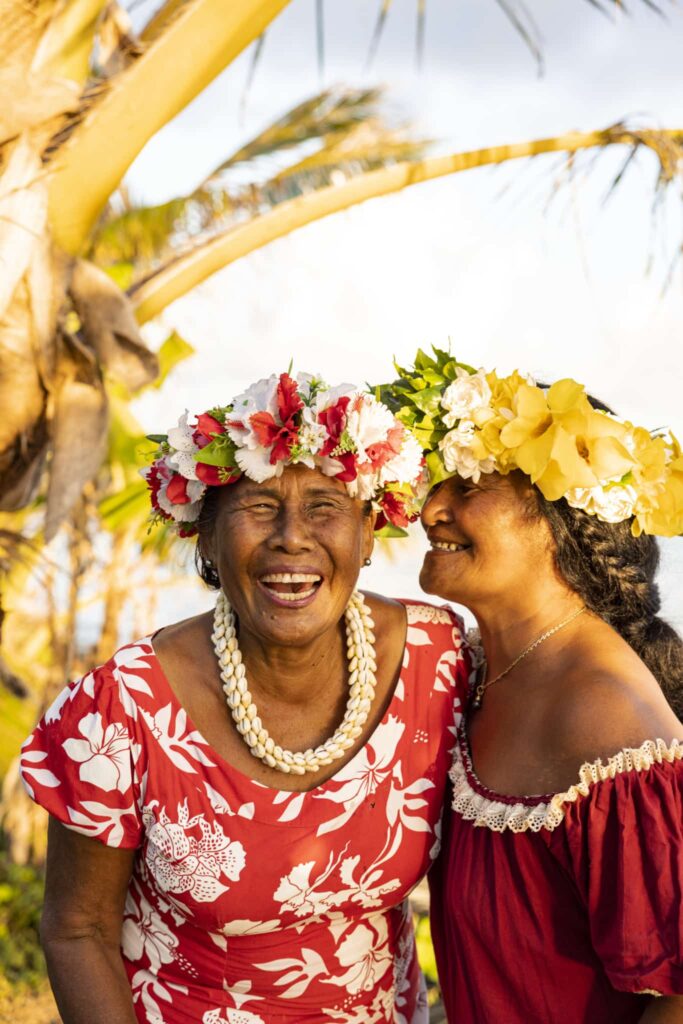
- You’ll make someone smile
Knowing or at least trying to say some words in Tahitian shows respect and interest in the local culture and the local people. This is huge for them since many people come only for the scenery and luxurious holiday with zero interest in the culture.
Learning a few words shows the opposite and pronouncing them with a foreign accent can come out super cute. This way, you might make many locals smile! …And maybe even laugh (if you mess up) but that’s okay, they’ll still appreciate the effort.
- The locals will love you even more ❤️
French Polynesians are already very friendly folks but if they see you speak their language, you’ll be their fave. You’ll receive better service, the staff will be even nicer, and who knows, maybe even a free drink.
- It’s all part of the fun
Also, isn’t learning a new language part of the travel adventure? I believe coming to Tahiti (or anywhere in French Polynesia) isn’t only about exploring different cultures but also about discovering ways to say ‘hello’ & ‘thank you’ in an exotic way.
- You’ll get a brain work-out
We all know we need to exercise our brains to keep them sharp and young for as long as possible. So why not do it in a productive way? This way you’ll not only do your brain some good, but you’ll also make your life easier when traveling. Two in one!
- You’ll understand their culture better
It’s always good to have at least some idea about what people are talking about, right? For example, if you hear about the ‘Tiare ceremony’ and you know what ‘tiare’ is in Tahitian, you know what to expect. And the more words you know, the better they can explain to you the details about the ceremony instead of just assuming what it might be.
Excited to start learning? Awesome! Be sure to take it easy, don’t be afraid to mispronounce words, and allow locals to help you. Google Translate won’t be of any use here so you’ll have one more reason to interact with the Tahitian people. Just print out my cheatsheet, and always have it with you. If you forget a word, you can always come back to it in the cheat sheet and learn on the go. :)
Have fun!
📌 Pintastic? Add it to your Pinterest board ⬇️
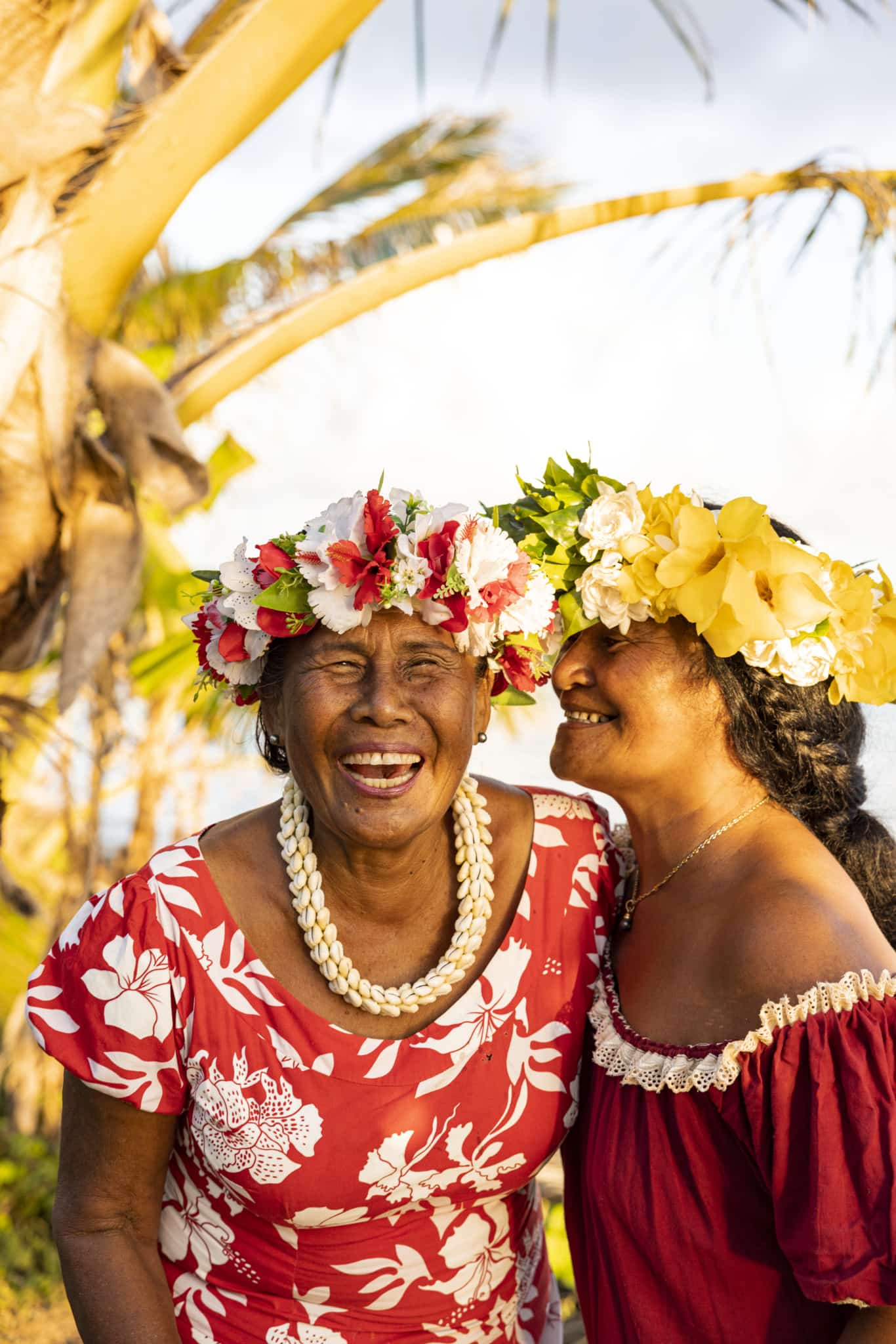
View comments
+ Leave a comment